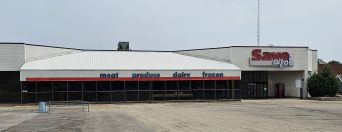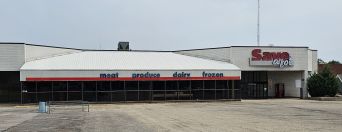CAPE GIRARDEAU, MO — South Cape’s food landscape shifted dramatically in late May with the quiet closure of the Save A Lot grocery store at 121 S. Sprigg Street—leaving the neighborhood without a single full-service grocery store.A visit to the store in its final days revealed empty shelves and a flurry of activity. Once-stocked aisles were nearly bare as employees boxed up remaining inventory and loaded it for transfer.
“They’re sending everything to the Sikeston store,” said one employee, referring to the Save A Lot location at 601 S. Main in Sikeston. The worker declined to be identified, citing concerns about job security. Meanwhile, the individual overseeing the operation—believed to be the owner or site manager—declined to comment when approached for more information.
A Community Without a Store

For years, the Sprigg Street Save A Lot served as a vital food source for South Cape residents, particularly those without vehicles. Its closure leaves an alarming gap in access, compounding the area’s long-standing designation as a food desert—a term used to describe neighborhoods where affordable, nutritious food is scarce or inaccessible.
Now, with no full-service grocer south of Broadway and east of West End Boulevard, residents are left to rely on high-priced convenience stores or travel long distances to shop for basics.
The closure has sparked deep concern among residents and community advocates. For many, it wasn’t just about groceries—it was about stability, routine, and being seen by the larger community.
More Than Inconvenience—A Public Health Risk
The fallout is more than economic. With fewer fresh food options, families are increasingly vulnerable to diets built around processed and fast foods—linked to chronic health issues like diabetes, hypertension, and heart disease. Public health studies consistently show that food deserts disproportionately affect low-income and historically marginalized communities, exacerbating long-standing health disparities.
Part of a National Pattern
The Cape Girardeau closure mirrors a national trend. Save A Lot, which has restructured significantly in recent years, continues to shutter underperforming locations as part of a broader cost-cutting strategy. At least 14 stores across the country have closed in 2025 alone, many of them in low-income urban and rural areas.
While such closures may make sense financially for corporate management, the local consequences are devastating—particularly when no replacement or alternative is in place.
What Comes Next?
The impact stretches beyond South Cape into nearby neighborhoods that also relied on Save A Lot. The pressing question now is: how will the community respond?
One promising local effort is South Side Farms, which operates a weekly farm stand every Wednesday from 11 AM to 2 PM at the corner of West End Boulevard and Walnut Street, directly across from Shawnee Park Center. The stand offers fresh, locally grown produce and is part of a broader vision to address food insecurity through sustainable, community-rooted agriculture.
Yet, a pop-up farm stand—no matter how well-intentioned—cannot replace the daily convenience and range of goods that a full-service grocery provides.
A Call for Long-Term Solutions
As South Cape navigates this new phase of its food crisis, broader support—from city leaders, health advocates, donors, and residents—will be essential to building sustainable solutions. Ideas like cooperative grocery ownership, public-private partnerships, and urban farm expansion are on the table, but they require real investment and commitment.
For many in South Cape, the loss of Save A Lot is more than the closing of a store—it’s a visible reminder of systemic neglect. But it may also be a catalyst for change.
The road ahead will be challenging. Yet the seeds of resilience are already in the ground—and with focused effort, South Cape can grow a healthier, more equitable future from the roots of this loss.


































